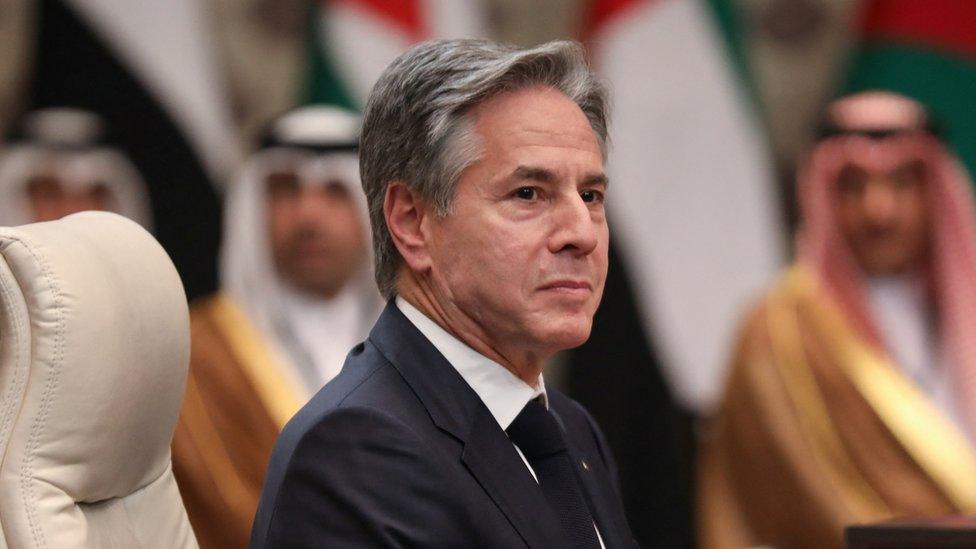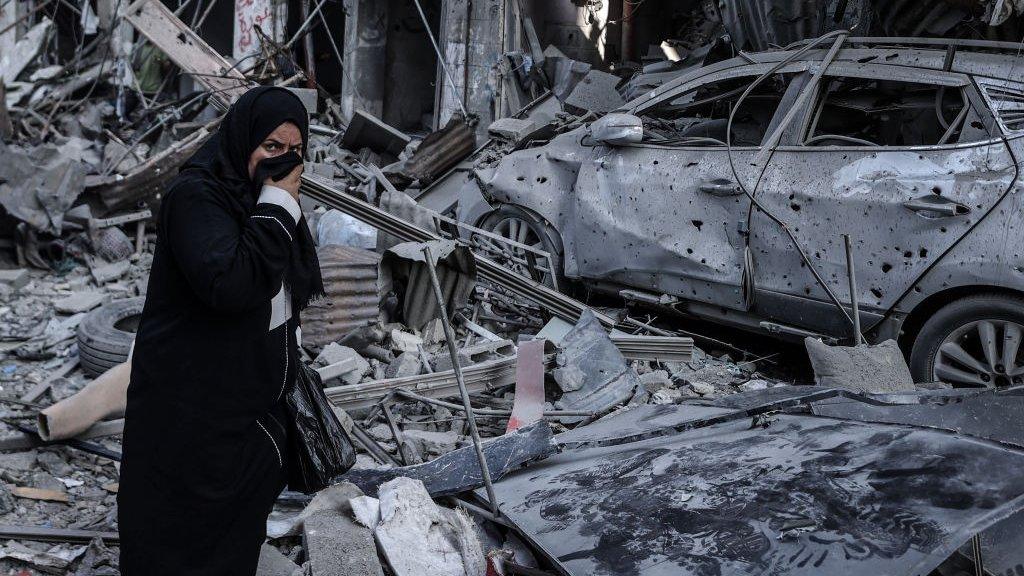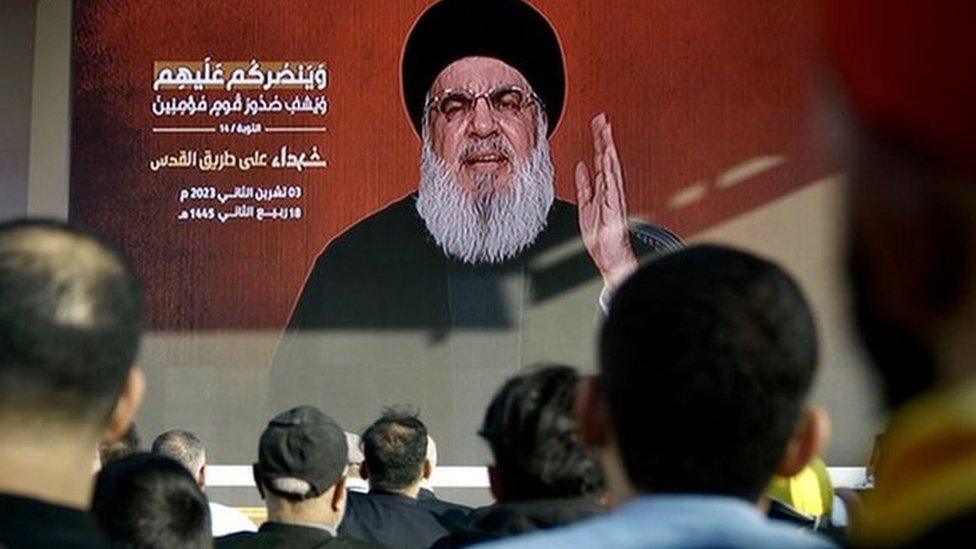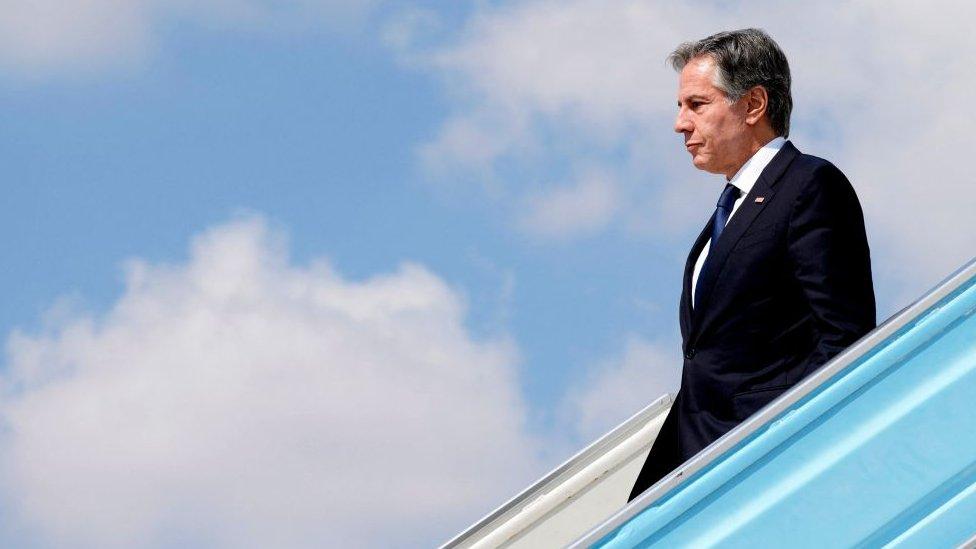Israel-Gaza war: Ceasefire would allow Hamas to regroup, says Blinken
- Published

Antony Blinken says been calling for humanitarian pauses in the war but has stopped short of calling for a ceasefire
US Secretary of State Antony Blinken has said an Israeli ceasefire in Gaza would allow Hamas to regroup and carry out further attacks.
But he added that Israel had to take "every possible measure" to prevent civilian casualties in the enclave.
Mr Blinken made the comments on Saturday in Jordan after holding talks with Arab leaders, who want an immediate halt to the fighting.
They have accused Israel of committing war crimes.
"We don't accept that it is a self-defence," Jordanian Foreign Minister Ayman Safadi said at a news conference with Mr Blinken following the talks, which also involved Saudi Arabia, Qatar, the United Arab Emirates and Egypt.
The US continues to support Israel's right to defend itself against Hamas.
Mr Safadi described the conflict as a "raging war that is killing civilians, destroying their homes, their hospitals, their schools, their mosques and their churches."
"It cannot be justified under any pretext and it will not bring Israel security, it will not bring the region peace."
There have been concerns that the war could draw in other regional actors and lead to the destabilisation of the Middle East.
Mr Blinken, who has been calling for humanitarian pauses in the fighting instead of a ceasefire, said that while the US disagreed with Arab leaders on some of the means to achieve a lasting peace in the region, their goal was the same.
"We all understand that we not only have an interest, but a responsibility to do everything we can to chart a better path forward together," he said.

More on Israel-Gaza war
Follow live: Latest updates
Analysis: Jeremy Bowen's five new realities after four weeks of war
From Gaza: Stories of those killed in Gaza
History behind the story: The Israel-Palestinian conflict

Israel began bombing Gaza after Hamas killed more than 1,400 people in Israel in surprise attacks on 7 October. More than 200 people were kidnapped and the majority are still thought to be being held as hostages.
At least 9,488 people have been killed in Gaza, according to the Hamas-run health ministry.
Mr Blinken's trip to Jordan comes a day after he visited Israel to speak with Israeli Prime Minister Benjamin Netanyahu, who said there would be no humanitarian pause until all Israeli hostages are released.
The Israeli Defence Forces (IDF) has been focusing its offensive in the northern part of Gaza, following repeated warnings for civilians to leave.
As many as 400,000 civilians are still in the area, according to the US special envoy for Middle East humanitarian issues, David Satterfield.
The IDF has also been carrying out strikes in the south and the United Nations has warned no part of Gaza is safe.
Mr Blinken spoke on Saturday of the need to dramatically increase the amount of aid that was getting into the enclave through Egypt's Rafah crossing.
Only limited deliveries are currently making their way into Gaza, weeks after Israel announced a siege - cutting off supplies of power, food and water.
The US Secretary of State has also met Lebanon's caretaker Prime Minister, Najib Mikati, to discuss the violence along Lebanon's southern border with Israel, where there has been frequent fighting between members of the Shia Islamist group Hezbollah and the Israeli military.
The leader of Hezbollah, Hassan Nasrallah, has so far refrained from calling for an escalation of attacks against Israel, but has left the door open for further action.
Mr Blinken will travel to Turkey on Sunday for two days to speak with President Recep Tayyip Erdogan about the conflict.
The visit comes after Ankara recalled its ambassador to Israel and broke contact with Mr Netanyahu in protest against the bloodshed.
Related topics
- Published4 November 2023

- Published3 November 2023

- Published16 October 2023
